Spotlight: Sandeep Das
A 2020 Guggenheim Fellow, Sandeep Das has established himself as one of India’s top-most tabla players. He is a prolific performer, composer, and educator, and has recorded over 30 albums. Sandeep is also the founder of HUM (Harmony and Universality Through Music), an Indian nonprofit organization dedicated to promoting global understanding through the power of the arts. Here, we interview Sandeep about his current projects, inspiration, work with Silkroad, and more!
How did you decide to become a musician? What drew you to your instrument?
Believe it or not, my journey started with a complaint from school. I had been tapping on my desk in class and when asked to stop, unbeknownst to me, I would start tapping with my feet. My father was told I should be taken to a doctor, and I feared the worst — doctors, needles, injections… who knows what else! To my surprise, when I got home, my father greeted me at the door with a big smile on his face. And just behind him, I noticed something sitting on the coffee table…
“Dad, what are those?” I pointed at the strange pair of drums.
“Those are Tabla, and your lessons start tonight!” That very evening, I was taken to my first Guru, Shri Sheo Kr Singh.
There’s a saying in India that you don’t choose the instrument — the instrument chooses you. For me, it was like love at first sight!
When did you first work with Silkroad? And if you remember, what was the project?
I was first introduced to Silkroad by our Iranian Kamancheh player, Maestro Kayhan Kalhor. Kayhan and I had been playing together for the past seven or eight years, and we had a trio called Ghazal, a very successful Indian/Persian music collaboration which had been nominated twice for a Grammy. When he was asked by Silkroad to write a piece that included tabla, he insisted on my recommendation. My first concert with the ensemble was for the world premiere of his piece, Blue as the Turquoise Night of Neyshabur. I remember it very vividly — it was a series of four world premiere concerts at Lincoln Center with the New York Philharmonic, conducted by Kurt Masur. I believe that was around 2001, so it’s been two decades now since I joined Silkroad!
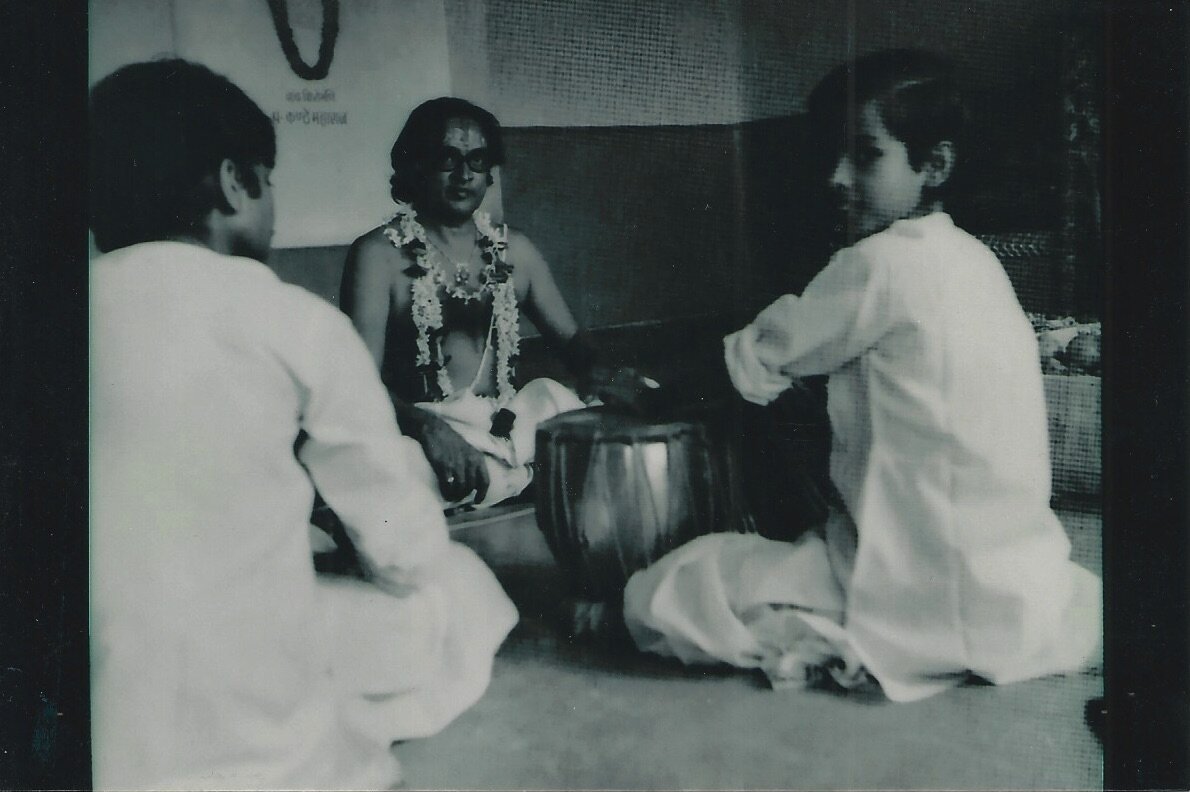
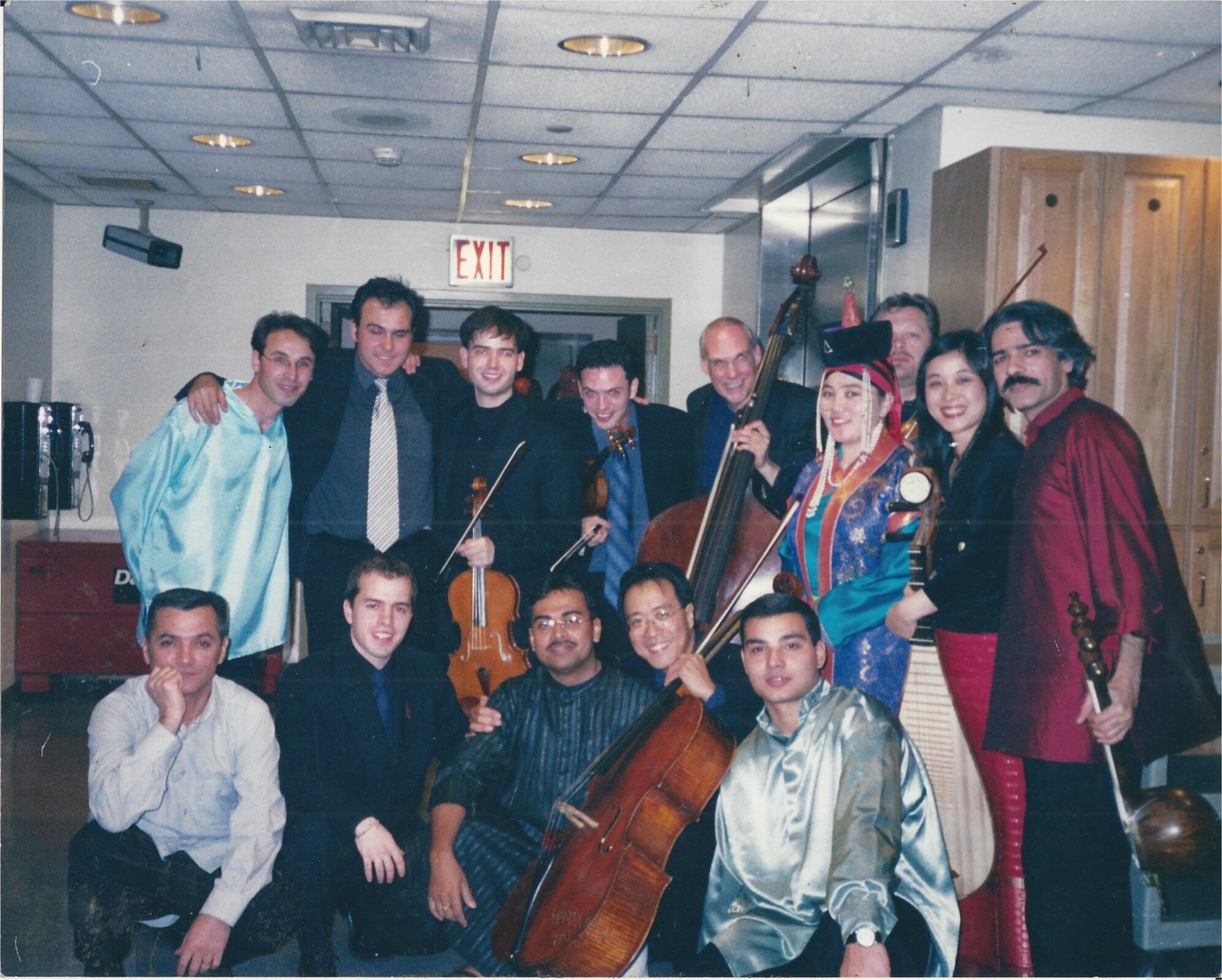
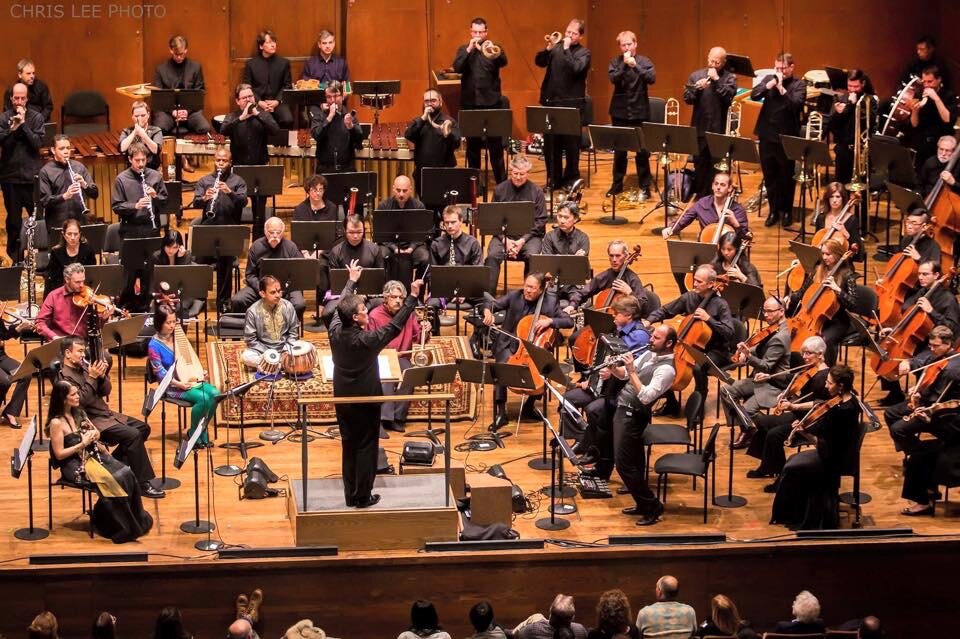
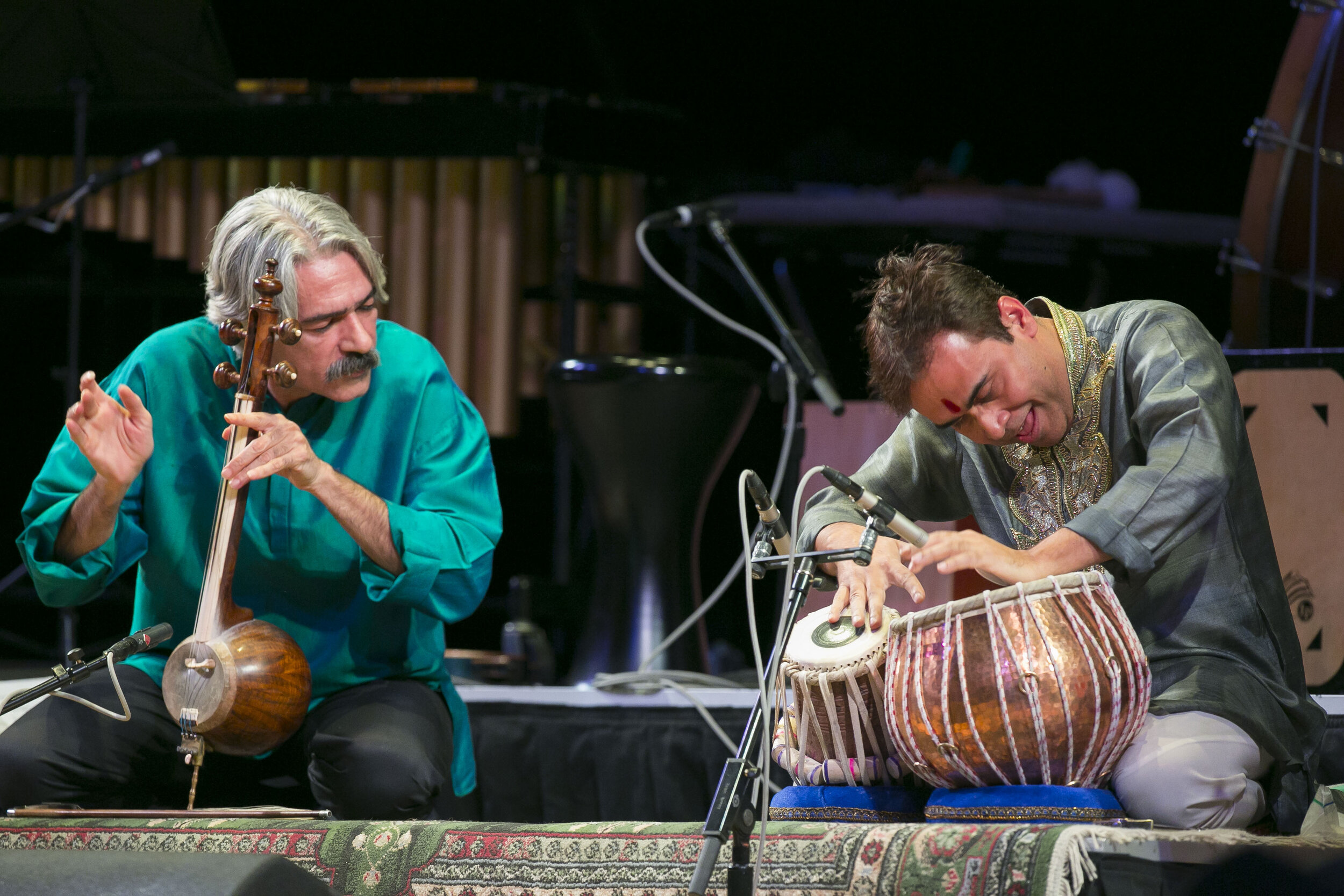
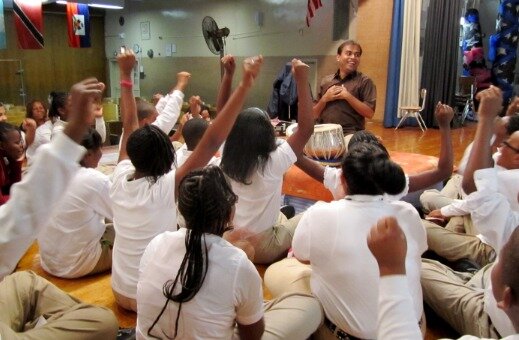
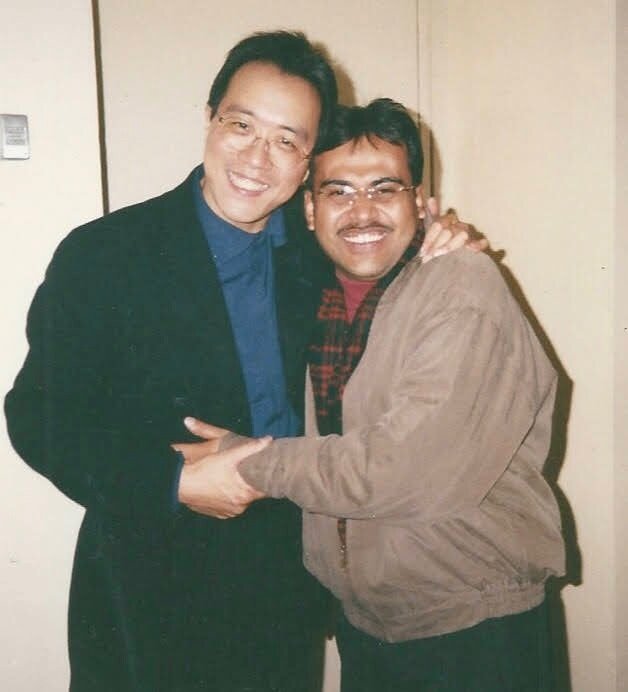
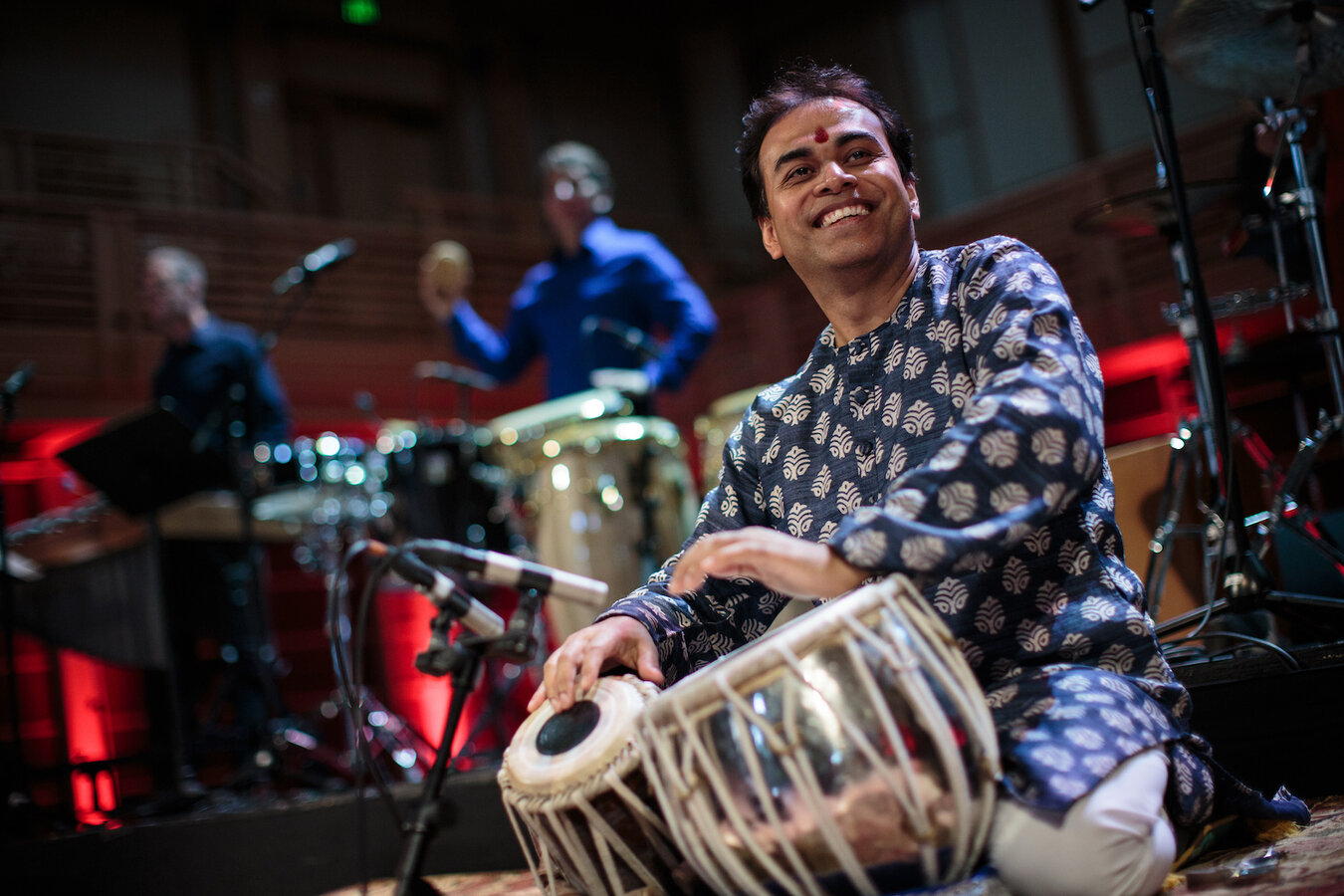
What is one of your favorite memories while working with Silkroad?
That’s a tough question! There are so, so, so, many happy memories. If I had to pick one, one moment that still stands out is the concert I was just talking about, my first concert with Silkroad. There I was, walking onstage at the Lincoln Center for the first rehearsal. As I’m getting ready to tune, a woman comes up in front of me and sets up a strange metal object. I looked at it curiously and asked, “What is this?”
“That’s your music stand.”
I had no idea what that meant, and I was a bit annoyed it was blocking my view! Before I could enquire further, another woman came up and put some sheets of paper on the stand. “What are those?”
“That’s your music.”
“But I don’t read music…”
Suddenly, there was pin drop silence, and I could feel 50 pairs of eyes on me as the entire orchestra stared in disbelief. They had flown in this guy from India, for four world premiere concerts, and he couldn’t even read music! (For those that might not know, Indian Classical Music is an oral tradition based on improvisation, so the concept of reading music during a concert doesn’t exist.)
I looked at the group and said, “Well, if you guys play it once, I should be able to memorize it.” Again there was silence. The piece was maybe 20-22 minutes long. Luckily, this man holding what I thought was a big violin stands up and says, “You know guys, I know these Indian musicians. They do some crazy stuff. Why don’t we just play it for him?” I remember thinking he was such a nice guy, and I was immensely grateful as the orchestra began playing. Halfway through the piece, I meekly raised my hand and said I was ready. There was another hush of disbelief, but as the piece started, I was able to play as if I had known it my whole life!
Later during the break, I went up to the principal violinist and asked about the guy with the big violin. “Who is that guy? He plays so well!” She seemed to think I was joking. “That’s Yo-Yo Ma.”
“Is he well-known?”
She stared at me for a moment and then realized I was being honest. I really didn’t know who Yo-Yo Ma was! Even today, she still teases me about that conversation. That was my first time meeting Yo-Yo and playing with the ensemble, and my first introduction to the world of Western Classical Music, which opened a whole new world for me. It’s an experience I will always cherish!
What makes you excited or inspires you as an artist and what kind of projects do you love working on?
Growing up in India, I lived and trained with my Guru for 12 years to learn the Tabla. When I was younger, I would look forward to going out and conquering the world with my music — fighting a battle onstage, winning over the audience, and emerging victorious! But, as life continues, you meet new people, and you gather new experiences. My perspective has since expanded, and I actually credit Yo-Yo and Silkroad for helping catalyze that.
About 10 years ago, I started thinking, “What am I doing to carry forward this amazing idea that Yo-Yo started?” The idea of collaborating across cultures and working to make a positive change in the world. And the answer didn’t satisfy me: I would come play, have a good time, head home, and that was it. So I decided I wanted to make a difference, and founded an organization called HUM in India, inspired in part by Silkroad. We started touring World Music and sponsoring the artistic studies of visually-impaired children in India, and it has since grown from three children to nine. This organization has now been around for about 10 years – the first kid I started with is now 15 or 17 years old, and is already playing good Tabla. To be a part of a child’s life in that way – having a positive impact on their life and creating opportunities they might not otherwise have – is an immensely fulfilling experience.
In addition to that, I would again take Yo-Yo’s name. A question he once asked himself really influenced me. Does the world really need another cellist? It made me think, and I started asking myself: Does the world really need another Tabla player? Is it enough to just be a good musician? The answer is an overwhelming no!
So, I started a project called Transcending Borders One Note At A Time around the time Silkroad won the Grammy. The Syrian crisis hit, and I saw this image of a little child, well-dressed, lying dead, face-down on a beach in Europe. That image just killed me. I picked up the phone and I talked to Yo-Yo, and I was like... just being angry is not enough. What can we do? And he said beautifully: Let's make more music. That inspired me to start the first project under the Transcending Borders canopy, Delhi to Damascus. I brought in Indian musicians and Syrian musicians, and we released the HUM Ensemble’s first album. That project was touring in Dallas, and at the end of one concert, the mayor of Dallas and his wife came up and said, “please continue doing what you are trying to do.” To me, that meant a lot. These days, projects which make a difference, or are at least genuinely attempting to make a difference, are what inspire me.
How has the pandemic affected you as an artist?
You know I’m a positive person, and I like to look at the glass as half full. Of course, the pandemic has affected me, just as it has affected every colleague I know, but I can also see that it has affected many more people in ways that are much worse. When I see that, I don’t feel that I have any right to be unhappy, depressed, or sad. Like many others, all my concerts and tours, in addition to events that I was looking forward to, have been cancelled, but I’m thankful and happy that my family and I are healthy. Musically, it has given me time to pause and think, and I have been able to work on things I have been postponing for years — hopefully some cool projects will come out of it!
Also, thanks to the technology we have, I have had some good opportunities to teach all over the world, which usually requires a lot more planning and travel. I recently taught a few classes for a music school in Melbourne, gave a few masterclasses for colleges across the US, and presented a TEDx talk for a school in India. I’ve also been able to spend a lot of time teaching my private students online, and have had some online concerts here and there. At the end of the day, I'm just thankful that I have a roof over my head and that the ladies (my wife and daughters) haven't kicked me out completely!
What kind of projects have you been working on and what can we expect in the coming months or year?
Right now, I'm working on releasing an album with Mike Block, my colleague from Silkroad, which should be out later in June (pre-orders available NOW!). I’m very excited about that!
Afterwards, the next major project is something which I got the Guggenheim Foundation Fellowship for Subah-e-Kashi Shaam-e-Shiraz (Morning in Kashi, Night in Shiraz). My hope is to do work that will connect these two cultures that I have roots in (Kashi) and friends from (Shiraz) and, by doing that, sharing that we are not so different. We might look different, we might speak different languages, but, ultimately, we are humans first.
Bringing positivity, spreading love, and spreading awareness about the commonalities we should be focusing on is one of the core themes of the Transcending Borders project I mentioned earlier, which this is a part of. It can be music, it can be talking to someone. It's about much more than just playing a concert.
What are you listening to these days?
Recently, I have gone back to reading books. I'm re-reading a book that I had read 15 years ago called Autobiography of a Yogi, which changed my life in many ways. I'm re-reading it now because, growing up in India, I have lived some of the experiences the author describes, and it has given me new insight on a spiritual level.
Listening-wise, Growing up, we would drool for my Guruji to pull out the old spool to play a recording of his Guru. Nowadays, all I need to do is get on YouTube and type his name, and I can take my pick from all the recordings other people have posted! I’ve been digging into old recordings of Indian maestros, listening to them, and enjoying them a lot.
What advice would you give to a young musician who has now read through all of these questions?
I would say follow your heart. Don't do anything that doesn't make you happy. Don't stop following your heart.
Is there anything else you want to share?
To whoever is reading this, my colleagues in Silkroad, and everyone I have met on this journey so far, I feel very lucky and grateful that I have always gotten love. With everything the world has been going through socially and politically, I think it's very important that we all go out and spread love.
